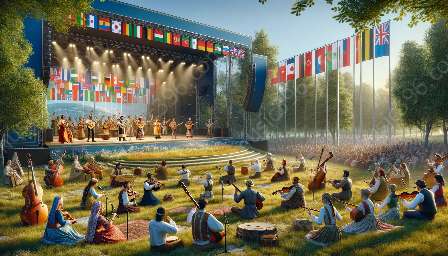Folk music represents a timeless link between generations, offering a window into the cultural traditions and values of societies. This article delves into the ethnomusicological study of folk and traditional music and explores the ways in which these musical genres are transmitted across generations.
The Cultural Significance of Folk Music
Folk music serves as a testament to a community's heritage, expressing the collective experiences, beliefs, and emotions of a people. This music often embodies the history and traditions of a culture, providing a medium for storytelling and an outlet for artistic expression.
One of the most compelling aspects of folk music is its ability to bridge generational gaps, preserving cultural identities and fostering a sense of continuity across time. Through the melodies and lyrical themes of folk songs, individuals can gain insight into the values and customs that have been passed down through the ages.
The Study of Folk and Traditional Music in Ethnomusicology
Ethnomusicology delves into the social and cultural aspects of music, offering a comprehensive understanding of how music forms an integral part of human societies. The field provides valuable insights into the role of folk and traditional music as a means of communication, identity formation, and social cohesion.
Researchers in ethnomusicology analyze the ways in which folk and traditional music are created, performed, and transmitted within communities. They explore the intricate connections between music and cultural practices, shedding light on the significance of music in shaping collective memory and cultural continuity.
Cross-Generational Transmission of Musical Traditions
The transmission of folk music across generations plays a pivotal role in preserving cultural heritage. As elders pass on their musical knowledge and repertoire to younger generations, they contribute to the perpetuation of cultural traditions and values. This process of transmission involves not only the transfer of musical techniques but also the imparting of the contextual meanings and societal functions of the music.
Through participating in the performance and preservation of folk music, younger generations develop a deep connection with their cultural roots, affirming a sense of belonging and identity. This transmission often occurs within familial and communal settings, creating opportunities for intergenerational bonding and the exchange of oral traditions.
Impact of Folk and Traditional Music on Society
The enduring presence of folk and traditional music in societies reflects its profound impact on collective consciousness and social dynamics. These musical forms serve as repositories of historical narratives, enabling individuals to gain insights into the experiences and struggles of their ancestors.
Folk music also functions as a catalyst for intercultural dialogue and understanding, fostering appreciation for diverse musical expressions and cultural practices. Through its cross-generational transmission, folk music reinforces community solidarity and resilience, nurturing a sense of pride in shared traditions and values.
Conclusion
The study of folk music and cross-generational transmission provides a rich tapestry of cultural insights and ethnomusicological perspectives. By understanding the multifaceted roles of folk and traditional music, we gain a deeper appreciation for the cultural fabric that unites generations and shapes the collective consciousness of societies.


























